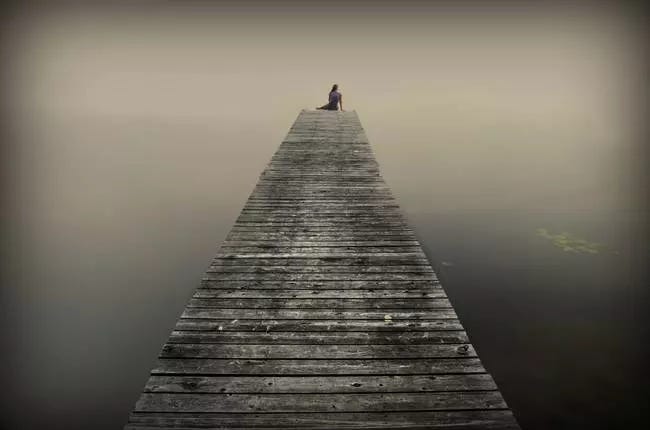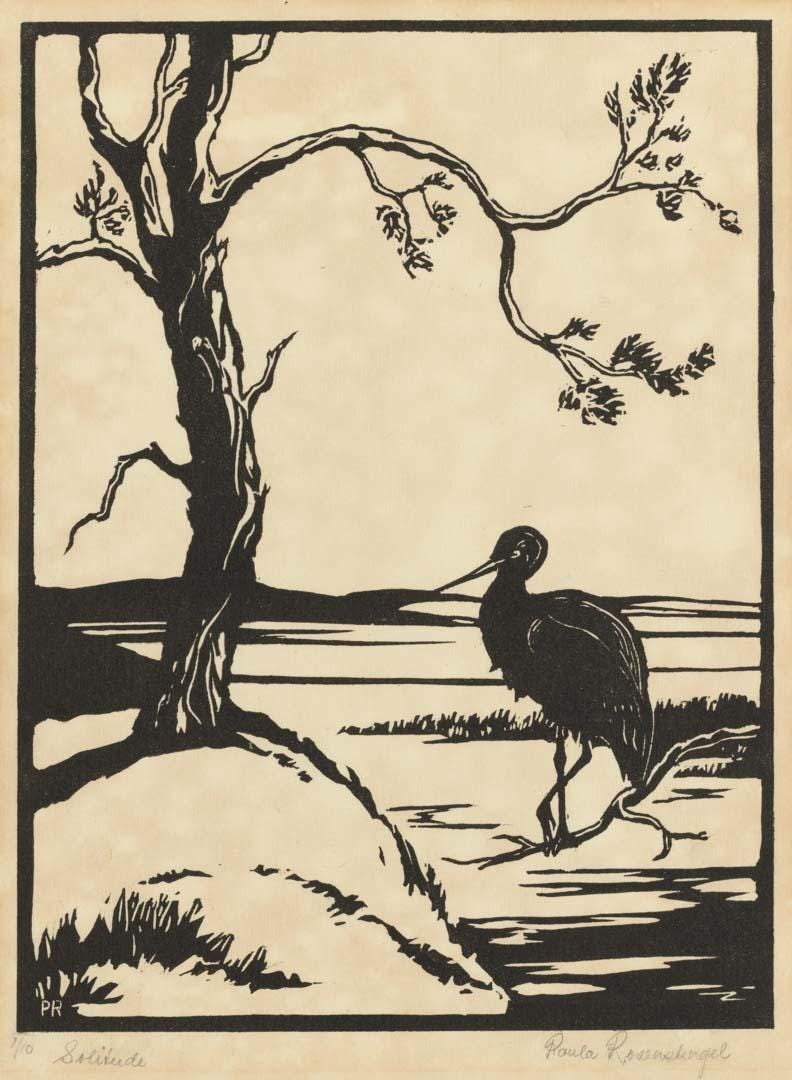#034 The Art and Science of Solitude
A deliberate practice of solitude is good for your wellbeing.
In the last 7 months, I did something (twice) that most people have looked upon with a mix of awe, confusion and surprise.
I took two solo holidays to Japan.
Without my husband, without my 3 children, without my friends.
The first time was in September last year.
Alone.
Me, a country I had never been to before, a language I didn’t speak, zero familiarity (unless you count the Instagram algorithm spam that previewed hedgehog cafes and shrines). And I want to acknowledge that I am extremely fortunate to be able to afford a solo holiday to anywhere, let alone overseas.
To some people this was indulgent, brave, crazy, exciting, something they could (or would) never do…
Why did I do it?
Image - Fractal Enlightenment
In 2023 we took a family holiday to the Gold Coast with a 2, 4 and 7 year old. To put it mildly, it wasn’t particularly relaxing. It was just parenting in another location, without all our things. And travelling as a family of 5 is expensive! So after the trip I casually dropped to my husband (and anyone else who would listen) that 2024 was the year of the solo holiday. Each parent could take a trip somewhere for a week or so and the kids could stay at home.
I said it enough times to enough people that it happened!
For the first half of 2024, I dreamed of the possibilities. A yoga retreat in Bali? A retreat with my meditation teacher in India? Japan? Initially, I didn’t really consider going somewhere solo. But in what was a pretty testing year – burn out, my dad passing away, changing jobs – I needed some solid me time.
And I found it during 6 delightful, solo nights in Tokyo. I hadn’t travelled solo (except for work, which doesn’t count, because you still have a schedule!) for more than 10 years.
I love solo travel for many reasons – you get to choose your own schedule, you don’t have to worry about pleasing other people, you build and prove your own self-reliance – the list goes on and on.
And you get to spend time with yourself.
I loved it so much that I did it again last month. This time, I travelled to Japan (again), but joined the most wonderful creativity and meditation immersion with my beloved meditation teacher Jac from The Broad Place. It was 8 days with 8 wonderful women, full of eating, creating, gaining clarity, and filling my joy cup. What struck me the most, was that some of the women with teenage kids on the immersion wished that they hadn’t waited so long to travel solo, which helped to assuage the teeny bit of guilt I did have for travelling without my family (but tbh most of the guilt centred on sticking my husband with the relentlessness of parenting again so soon after returning from a 10 day work trip – thanks darling!).
While I was away, I read a book by Buddhist scholar Stephen Batchelor called The Art of Solitude. This passage stuck with me:
There is more to solitude than just being alone. True solitude is a way of being that needs to be cultivated. You cannot switch it on or off at will. Solitude is an art. Mental training is needed to refine and stabilise it. When you practice solitude, you dedicate yourself to the care of the soul… Solitude is not a luxury for the leisured few. It is an inescapable dimension of being human.
When talking about my solo adventures with some friends (especially mum friends), there almost seems to be an element of fear to solitude, to being alone, to leaving family behind.
When you become a parent, so much of your identity is stripped away – along with your freedom. Once your child is old enough for daycare or school, or you return to the work, who are you? Without the title of parent, mum, or wife, or partner or worker – who are you and who do you want to be?
Spending time alone, in conversation with yourself, your soul, is one of the only ways to work this out. And you don’t need to go to Japan (or far away at all!) to find solitude.
My conversation with myself is still a work in progress. But my trips really highlighted to me the value I place on time and space – to create, to write, to do things outside of work and outside of family time, and to spend time alone. One of the hardest things about becoming a parent for me is the feeling of needing ‘permission’ to carve out space for myself. But I am fortunate to have a partner and kids who support my need for solitude – and to have made the effort to normalise time away in my house (and the promise of Pokémons and grape-flavoured Japanese lollies also helped). It is recognised that I am a better wife/mother/friend/human when I practice solitude.
Is there an ideal amount of time to spend in solitude?
Science says no. One study highlights that spending time alone can be a healthy, positive choice, and that there is no universal level of socialisation or solitude to aim for. So you might feel like your cup is filled after 1 hour alone – others might feel like they need a couple of days to truly unwind. And for some, it might be a fine balance to strike between positive solitude and unwelcome loneliness.
When was the last time you spent a chunk of time with yourself? Maybe you went out to lunch or dinner solo? Or went on a solo walk? Or spent a night or two away alone?
You might think that you do some of these things frequently – but are you truly practicing the art of solitude? If you are eating out alone, are you savouring your food and your surroundings, or are you scrolling on your phone? If you are out for a walk, are you with your own thoughts – or are you listening to someone else’s through your headphones?
One of the things that struck me the most in Japan was that eating out solo is commonplace, and because it is so normal there is no awkwardness to it. No one was distracting themselves from the discomfort of being alone on their phones, they simply enjoyed their meal and got on with life. Studies have found that the positive effects of solitude on wellbeing are eroded if the majority of our time spent alone is spent staring at a screen.
Embedded within the practice of solitude, is embracing the discomfort of sitting with your thoughts. Next time you have a spot of solitude – maybe its sitting on the bus, or going for a walk, or sitting on a park bench – simply notice your thoughts. What do you think about? Are you rehashing a past conversation from that morning (or weeks ago), or are you writing a mental list of things you need to do that week?
How many of you just noticed the feeling of the breeze, or the smell of autumn, or the sound of cars? In other words – how many of you just sat with yourselves in the present moment?
Image: ‘Solitude’ - QAGOMA Online
It’s hard, isn’t it - our minds jump all over the place! I have noticed through regularly practicing meditation, I have been able to catch my mind in its stories of the past or the future and to gently redirect it back to the present moment. Some days I might only have to redirect a handful of times, other times my mind is so busy pinging around and it takes a lot more effort to slow my thoughts down.
Now that I am back from my solo adventures, I am making a real effort to ensure I have regular pockets of solitude during my week.
Why? Because I seek a more easeful life, with less grasping to things, outcomes and people.
In The Art of Solitude, Stephen Batchelor frequently reflects on the essays of Michael de Montaigne, a 16th century French philosopher. Despite being written in 1580, I think the below absolutely applies to our busy, modern lives today.
Now I believe that the sole end of solitude is for one to live more at leisure and at ease by oneself… In ridding ourselves of the courthouse and marketplace we do not rid ourselves of the principal worries of our life. Ambition, covetousness, indecisiveness, fear and desires hardly abandon us just because we change address. They pursue us…That is why it is not enough to remove oneself from people, not enough to go somewhere else. We have to remove ourselves from the habits of the populace that are within us. We have to isolate our own self and return it to our possession… We keep returning our gaze to the things we have left behind; we fantasise about them constantly.
He goes on to write,
The solitude which I love and advocate is primarily about bringing my emotions and thoughts back to myself, restricting and restraining not my footsteps but my desires and my anxiety, refusing to worry about external things, and fleeing for dear life from servitude and obligations: retreating not so much from the crowd of humanity but from the crowd of human affairs.
So now that I am back in the thick of work and parenting and life again, I am starting a deliberate practice of solitude. It probably won’t be something I get to daily, but if I can eke out pockets of time to sit outside in the autumn sun to watch the leaves turn, I know my soul and self will be a lot happier and healthier. I know this practice will help me to bring my emotions and thoughts back to myself.
If this has piqued your interest in a solitude practice (because, let’s be honest – solitude is unlikely to happen accidentally), I will leave you with this final passage from de Montaigne:
We should set aside a room at the back of the shop, just for ourselves, quite isolated, where, as the principal retreat for our solitude, we establish our true freedom. In there we should resume our usual conversation with ourselves – in privacy, with no contact of communication with anything outside – where we can chatter and laugh to ourselves as though we had no wife, no children, no possessions, no attendants…So when it comes time to lose these things, it will be nothing new for us to be without them.
I would love to hear your thoughts on solitude – and whether the prospect of a solitude practice frightens or excites you!
Be well,
Alicia







I was so jealous looking at your solo Japan photos!
I think I’d do alright by myself. But I would struggle with the guilt of leaving David at home solo. Don’t get me wrong - we do 2 nights solo here or there. A week would be bliss.one day soon, I think.
As usual, very well written and made me think. X
Love this